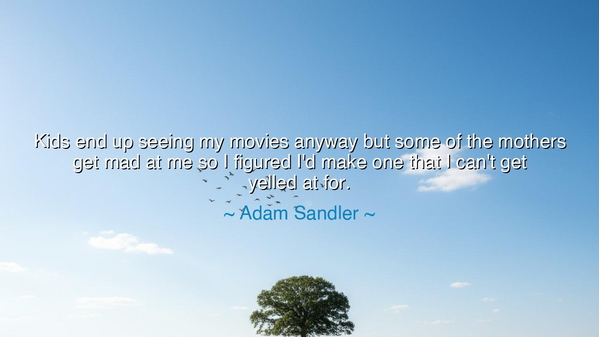
Kids end up seeing my movies anyway but some of the mothers get
Kids end up seeing my movies anyway but some of the mothers get mad at me so I figured I'd make one that I can't get yelled at for.






Adam Sandler’s words, "Kids end up seeing my movies anyway but some of the mothers get mad at me so I figured I'd make one that I can't get yelled at for," speak to the tension between artistic expression and the responsibility that comes with the influence of public figures. Sandler’s acknowledgment that his films, often filled with irreverence, humor, and mature content, inevitably find their way into the hands of younger audiences, reveals the complexity of his role as an entertainer. The frustration of parents, especially mothers, who seek to shield their children from material they deem inappropriate, stands in stark contrast to the popularity of Sandler’s films among children. In this moment of self-awareness, Sandler cleverly recognizes the need for a balance between personal freedom as an artist and the external expectations of society.
In the ancient world, storytellers, poets, and dramatists were often subject to similar tensions. Consider the famous works of Aesop, whose fables, though intended for children, often carried hidden lessons meant for adults. The fable of the tortoise and the hare teaches not only children about perseverance but adults about the consequences of pride and overconfidence. These ancient stories, like Sandler’s films, were meant to be multi-layered, able to appeal to different audiences while still containing moral teachings. Yet, in Aesop's time, just as today, some found it difficult to accept that stories intended for children could carry deeper meanings that might challenge or question societal norms.
The Greek playwrights had their own struggles with the balance between entertainment and moral responsibility. Aristophanes, for instance, wrote satirical comedies that often poked fun at the political and social issues of his day, such as war, corruption, and the abuses of power. While his works entertained the masses, they were often met with criticism from those who feared that his irreverence might mislead or corrupt the minds of the youth. Aristophanes, however, had a deep understanding of the power of comedy to provoke thought and reflection, even while making people laugh. Much like Sandler, he had to navigate the fine line between creating art that was entertaining and art that might also cause moral discomfort in those who watched.
In many ways, Sandler’s reflection on making a film that would not provoke ire from parents parallels the wisdom of the ancient kings who understood the delicate balance between maintaining order and entertaining the masses. Consider King Solomon, whose wisdom was not simply about ruling with strength, but about understanding human nature and responding appropriately to the needs of his people. In the Proverbs, Solomon writes about the importance of teaching children and the responsibility that parents have in guiding them. Yet Solomon also acknowledges the challenges parents face, knowing that young minds are impressionable and should be carefully protected from certain influences. Just as Sandler contemplates creating a more family-friendly film, Solomon’s wisdom recognizes the balance between freedom and responsibility, between entertainment and education.
This theme of artistic responsibility is central not only to entertainers like Sandler but to all creators. In the Renaissance, artists like Michelangelo and Leonardo da Vinci navigated the tension between their personal creative expression and the expectations placed on them by powerful patrons or the church. Michelangelo’s Sistine Chapel, for example, is both a masterpiece of artistic brilliance and a deeply religious work designed to communicate divine truths. The tension between his artistic freedom and the moral message of the Church was ever-present. Similarly, Sandler, though working in the world of comedy and entertainment, recognizes that his art has the potential to influence not just adults but children. By choosing to make a family-friendly movie, he acknowledges the impact of his work on younger audiences and the role of humor in shaping their perceptions of the world.
The lesson that emerges from Sandler’s words, and from the examples of ancient and Renaissance artists, is one of responsibility in creation. Just as Socrates famously said, “The unexamined life is not worth living,” so too must creators of art examine the impact of their work on those who will consume it. Art has power—it shapes minds, it molds cultures, and it influences how we see the world and each other. Therefore, while we must celebrate freedom of expression, we must also remember that with great power comes the responsibility to use that power wisely. Sandler’s decision to make a movie that can be enjoyed by children without the backlash from parents shows his understanding of the delicate balance between personal creativity and public accountability.
As you move through life, embrace the power of your voice, whether through art, words, or actions, and consider the impact you have on those around you. Like Sandler, ask yourself: What legacy do I want to leave behind? Understand that your creativity, your work, or your influence can either uplift or cause harm, depending on how it is shared with the world. Just as Solomon’s wisdom guided rulers, and Michelangelo’s masterpieces inspired awe, so too can your actions create ripples of change. Create thoughtfully, express yourself freely, but always with an awareness of the responsibility that comes with your influence. Whether in art, communication, or personal relationships, ensure that your work reflects the best of humanity and invites growth in others, especially those most impressionable.






AAdministratorAdministrator
Welcome, honored guests. Please leave a comment, we will respond soon